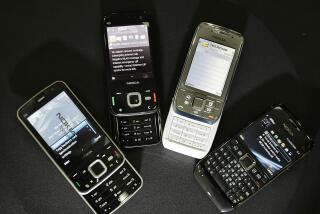Non-Techies Feel the Pressure in Buying for Gadget Hounds
Face it. There’s no way to escape technology.
Even for those who spend the first 11 months of the year scrupulously avoiding such gadgets as personal digital assistants and watches that double as digital cameras, along comes December to mess up their best-laid plans.
That’s because December means one thing: holiday shopping. Chances are, even the most technophobic shoppers have at least one gadget fanatic on their shopping lists. And that means the inevitable encounter with all those gizmos that would otherwise exist only in a parallel universe.
That is the predicament of people such as Charles Vaughan.
If pressed, Vaughan insists he could learn how to use the Sharp Wizard digital organizer he received as a graduation gift three years ago. But he’s the sort of person who would rather keep track of his life with a half-dozen pieces of note-pad paper scattered around his desk.
After staring at a PC for as long as eight hours a day as a biostatistician for a Bay Area pharmaceutical company, he looks forward to reading a book when he gets home after work.
On the other hand, Vaughan’s wife, Misha, a senior usability engineer for database software giant Oracle, is a gadget hound. She recently bought a $100 electronic kitty-litter changer that uses an infrared motion sensor and a mechanical scooper claw to automatically clean up after the couple’s cats.
Charles believes that, left to her own devices, Misha would rush out to buy every device as soon as it hit the market. He has managed to restrain her mania, getting her to at least wait until the prices come down a bit.
Luckily for Charles, Misha does much of the gadget research for him. She gives big hints about what’s on her holiday wish list.
“She’s fond of flipping through the Hammacher Schlemmer catalog and saying, ‘Ooh, look, there’s an inflatable house!’ ” he said. “When she’s found something of interest, she bends the page back and leaves it on the coffee table for a long time.”
This year, Charles said, he is likely to get Misha a CD burner for their Compaq PC. He probably will turn to his mother, a tech-savvy neurophysiologist, for advice.
Each December, despite his decidedly low-tech leanings, Charles Vaughan finds himself swept up in a technological stampede--and he is hardly alone in his predicament.
According to the market research firm PC Data, nearly one-third of computer hardware sales occur during the last three months of the year, and most of those sales are compressed into the last five weeks before New Year’s Day.
“Without a doubt, the number of shoppers who are really uninitiated into the technical arena is greatest during the holiday selling season,” PC Data analyst Steve Koenig said.
For some particularly popular items, the holiday shopping season is even more critical. About 35% of the 1.2 million color flatbed scanners sold last year were sold during the fourth quarter, as were 42% of the 667,000 personal digital assistants. Koenig expects PDAs will be even hotter this year because there are new models on the market with color screens and wireless Internet connections.
Hammacher Schlemmer, the Chicago-based retailer favored by Misha Vaughan, pre-screens many of its products to make things easier for folks like Charles Vaughan. At the Hammacher Schlemmer Institute, items ranging from electronic dartboards to digital tire gauges are put through their paces by six staff testers and a group of outside consultants. Only the best items make their way into the Hammacher Schlemmer stores and catalog, spokeswoman Sabrina Balthazar said.
Since its founding in 1848, Hammacher Schlemmer has introduced shoppers to many high-tech marvels, including the first pop-up toaster in 1930, the first microwave oven in 1968 and the first cordless telephone in 1975.
“Those are things that went on to become American lifestyle necessities,” Balthazar said.
Judging by Hammacher Schlemmer’s current catalog, items such as electric bicycles and voice-activated remote controls for TVs, stereos and DVD players someday will become commonplace.
Rival retailer Sharper Image for years relied on technology aficionados for its core clientele. But in the last five years, the profile of its typical shopper has shifted from a wealthy, highly educated male to a less tech-savvy person who is likely to be female.
Kathryn Grant, senior manager of the company’s Internet strategy, attributes the shift to the fact that technology has become more commonplace in mainstream society.
“Technology has been integrated not only into products we all recognize as being high-tech, like a stereo system or a computer, but also into something as basic as an air cleaner,” she said.
Indeed, Sharper Image sells a silent air purifier that uses electromagnetic current instead of a fan to pull particles from the air. Other bestsellers include a hair dryer that uses positively charged ions to reinforce the hair’s protective cuticle layer as it’s drying and a CD player for use in the shower. Even the most reluctant of tech shoppers can feel comfortable buying a hair dryer or waterproof CD player.
“We have a lot of technologically advanced products, but not everyone needs to know the ins and outs of how they work,” Grant said.
*
Times staff writer Karen Kaplan covers Southern California technology companies.







